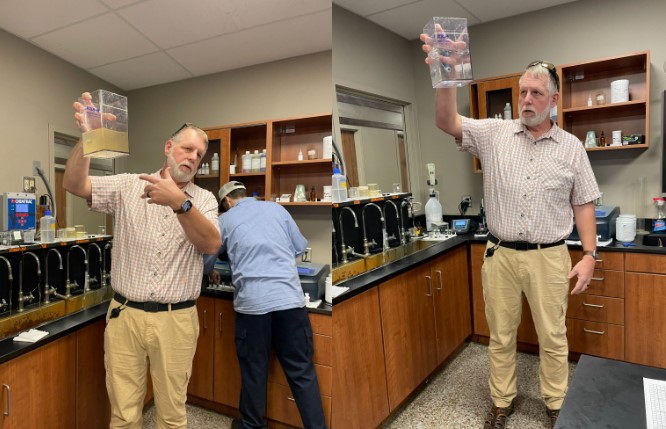Today, May 4, is PWC Day. Several times a year, the Fayetteville Public Works Commission invites community stakeholders and customers to a day-long tour that includes their generation plant, water/wastewater treatment plants, customer service operations, emergency operations and the functions of line workers and water utility workers.
PWC is a public utility and PWC Day is one of several initiatives they have implemented to stay in touch with their customers and community. PWC serves over 110,000 people, employs 650 people and has been in business for 113 years.
The day began with an introduction and welcoming remarks from interim CEO/General Manager CEO Mick Noland.
“This is your hometown utility. We are very proud of what we do here. The staff is very engaged. They really care about what they're doing...There's all kinds of perils out there that mother nature and others throw at us. So we have a very dedicated staff…” said Noland.

The first stop of the day was the Butler-Warner Generation Facility. Fayetteville PWC is the only municipal utility in the state that owns and operates a power generation plant. This plant earns $12 million annually to offset PWC power costs. PWC purchases power from Duke Energy and this plant is dispatched for use by Duke Energy in times of need such as extreme cold spells in winter or extreme heat waves in summer.

The second stop was the Cross Creek Water Reclamation Facility. The daily wastewater treatment capacity is 25 million gallons at Cross Creek and 46 million gallons across both facilities. This facility treats, disinfects and returns water to the Cape Fear River. Scott McCoy leads operations at this facility and the Rockfish Creek Water Reclamation Facility. “Essentially our responsibility is to protect the downstream user and the aquatic life, and that’s what we do,” stated McCoy.

The third stop was the P.O. Hoffer Water Treatment Facility. PWC treats 10 billion gallons of drinking water a year and has a capacity for treating 57.7 million gallons daily across their two facilities. The P.O. Hoffer facility alone can treat Hoffer can treat 39.5 million gallons daily. At this location water, primarily sourced from the Cape Fear River, is treated to make it safe for drinking and then pumped into homes and businesses across the city.
It is easy to forget how much time and effort goes into having quick access to clean water and reliable heating and cooling systems. PWC Day is a great reminder of how important these jobs are in our daily lives.

Cookout season is officially in full swing, and if you’re tired of grilling your own, the Haymount Truck Stop has an exciting option for the whole family! The Truck Stop’s inaugural burger competition is happening on Saturday, July 19.

Adiós. Au revoir. Auf Wiedersehen.No, I am not leaving the Greater Fayetteville Business Journal, but I am going on a long overdue vacation!Hello dear readers, this is my roundabout way of announcing to the community that starting on July 4, any and

In a city where traditional lending channels can overlook aspiring business owners from underserved communities, the Tulsa Initiative is changing the narrative around access to capital. The Fayetteville-based nonprofit has worked to expand its missio